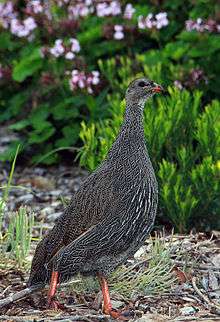Cape spurfowl
| Cape spurfowl | |
|---|---|
 | |
| At Kirstenbosch National Botanical Garden, South Africa | |
| Scientific classification | |
| Kingdom: | Animalia |
| Phylum: | Chordata |
| Class: | Aves |
| Order: | Galliformes |
| Family: | Phasianidae |
| Subfamily: | Perdicinae |
| Genus: | Pternistis |
| Species: | P.capensis |
| Binomial name | |
| Pternistis capensis (Gmelin, 1789) | |
| Synonyms | |
| |
The Cape spurfowl, or Cape francolin (Pternistis capensis) is a gamebird in the pheasant family Phasianidae. This francolin is endemic to the southwestern Cape of South Africa.
The Cape francolin is a bird of scrubby open areas, preferably close to running water. Its nest is a grass-lined scrape under a bush, and six to eight eggs are laid (but sometimes two females will lay in one nest). This species can become very tame if disturbance is limited, and will feed in gardens, by roadsides, or with farmyard chickens. It will run rather than fly if disturbed, but even while quite small, just a few weeks old, it flies readily and strongly if startled or pressed.
The call is a loud cackalac-cackalac-cackalac.
Description
The Cape spurfowl is 40–42 cm (16–17 in) in length. The male, at 600–915 g (1.323–2.017 lb), averages larger than the female, at 435–659 g (0.959–1.453 lb).[2] This large francolin appears all dark from a distance, apart from the red legs, but when seen closer the plumage is finely vermiculated in grey and white, with a plainer crown and nape.
The sexes are similar in plumage, but the male has two leg spurs whereas the female has at best one short spur. The juvenile is similar to the adults, but has duller legs and clearer vermiculations. This large dark francolin is unlikely to be confused with any other species in its range.
References
- ↑ BirdLife International (2012). "Pternistis capensis". IUCN Red List of Threatened Species. Version 2013.2. International Union for Conservation of Nature. Retrieved 9 September 2014.
- ↑ CRC Handbook of Avian Body Masses by John B. Dunning Jr. (Editor). CRC Press (1992), ISBN 978-0-8493-4258-5.
- Madge and McGowan, Pheasants, Partridges and Grouse, ISBN 0-7136-3966-0
- Sinclair, Hockey and Tarboton, SASOL Birds of Southern Africa, ISBN 1-86872-721-1
External links
- (Cape spurfowl = ) Cape francolin - Species text in The Atlas of Southern African Birds
| Wikimedia Commons has media related to Pternistis capensis. |

